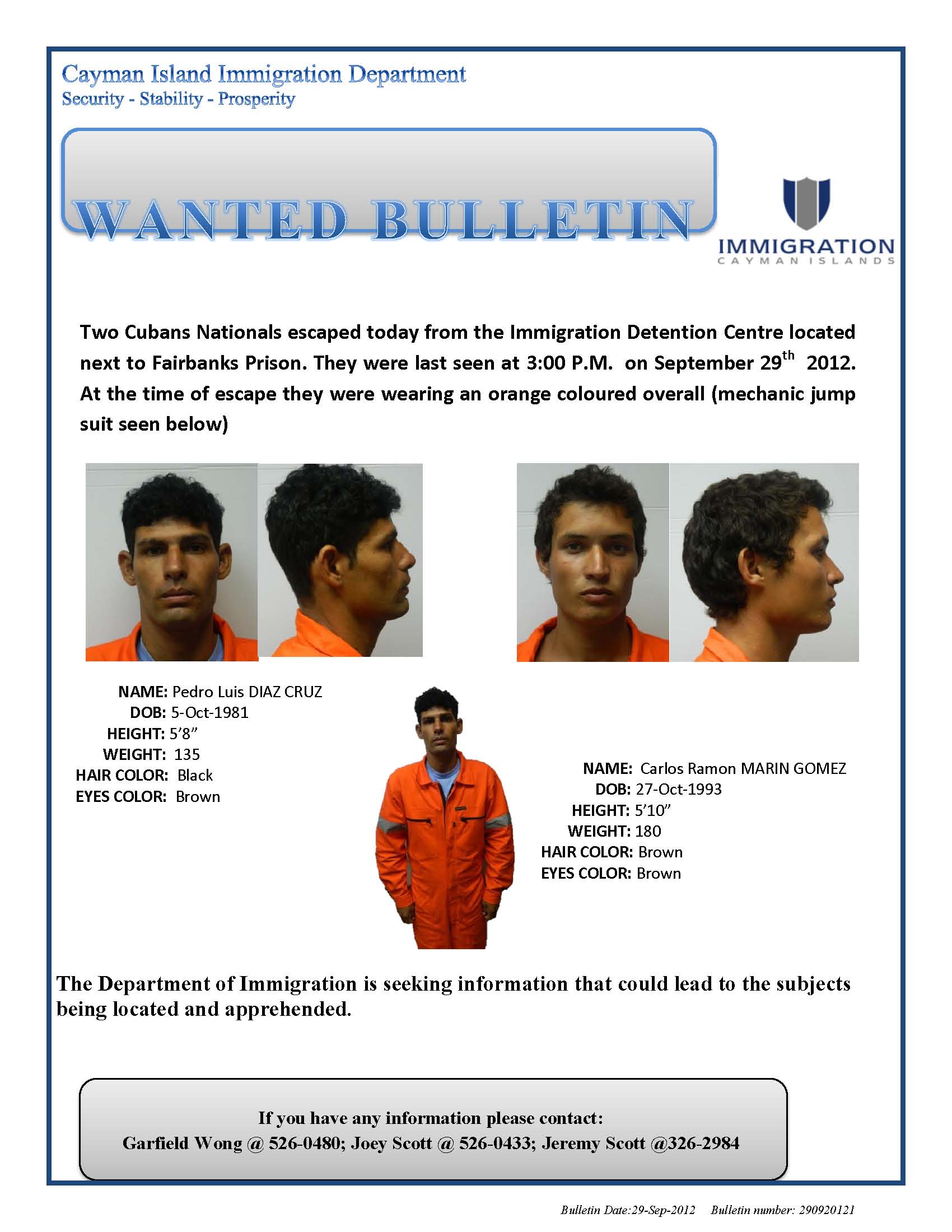Archive for September 30th, 2012

A right to know
The Cayman Islands joined over 80 countries around the word celebrating International Right to Know Day on Friday, 28th September. While the importance of openness and transparency is increasingly recognized and translated into Freedom of Information legislation around the world, the Cayman Islands remains one of the trail blazers in the Caribbean in this regard.
While there are at least 12 countries or territories in the Caribbean that have FOI Legislation at some stage of development and implementation – either as a draft, passed or dormant law – research shows that we in Cayman are amongst the most advanced in terms of the implementation and operation of our FOI Law. Recently our legislation has been copied by the Bahamas, and it has also serves as an example for Bermuda, but so far many FOI regimes in the Region remain in their infancy.
However, in Cayman we have now seen almost 4 years of a vibrant and active Freedom of Information Regime: a steady number of requests are being responded to by public authorities and the Information Commissioner’s Office is busily hearing appeals and monitoring compliance. Internal policies and procedures are in place within Government and the ICO to ensure that the objectives of the FOI Law are being upheld.
These objectives are stated in the Law itself, and are worth repeating. The FOI Law aims to reinforce and give further effect to certain fundamental principles underlying the system of constitutional democracy, namely – government accountability, transparency and public participation in decision making. This is achieved by granting to the public a general right of access to records held by public authorities, but there are also exemptions to disclosure which balance this right against the need to keep some records confidential for various reasons.
Although in practice finding the balance between the general right to access and legitimate exemptions under the Law can at times be complex, there can be no doubt that the FOI Law has positively changed, and continues to change the way both the general public and public officers view official records and information.
Recently in the UK the Justice Select Committee of Parliament completed a “post-legislative scrutiny” of the FOI Act 2000. A close parallel can be drawn between its findings and our experiences in Cayman, and it is worth summarizing some of these findings.
The Select Committee’s report calls the FOI Act “a significant enhancement of our democracy”, and agrees with most of the witnesses that the Act is working well, calling FOI a “constitutional right, a fact that can get lost in complaints about the operation of the FOI regime”. On the question of cost, the Committee concluded that “the cost to public authorities must be weighed against the greater accountability the right to access information brings”, since “there is evidence of both direct cost savings, where [an FOI] request has revealed erroneous public spending, and an indirect impact whereby public authorities know that they will be exposed to scrutiny.. . and use resources accordingly.”
The report reaches these further conclusions:
– Proactive publication is important in achieving openness and transparency. It also reduces the number of applications made;
– there should be no changes to the system of “requestor blindness”, since the focus of FOI is on whether disclosure is justified, not on the identity of the requestor. As well, it would be prohibitively expensive to police a system that requires each applicant to provide their real name;
– public authorities should continue to use existing exemptions to protectthe necessary “safe space” for high-level policy discussions. Research shows that the so-called “chilling effect” of FOI on such discussions is negligible;
– when public functions are outsourced to the private sector, contractual terms should clearly safeguard the public’s access rights.
As the new Constitution is about to come fully into force, we should all strive to uphold and promote the tenets of good governance. Therefore, we are delighted to boast that in the area of Freedom of Information we have made great strides over the last four years. We encourage the Public Sector, at all levels, to embrace a culture of openness and transparency, to support the proactive disclosure of information, and to comply with the provisions of the Freedom of Information Law. We encourage members of the public to embrace your right to know, and use the Law responsibly to assist you in being better informed citizens.
See more about FOI Below

Community urged to take more care of elderly
 (CNS): Given the vulnerability of the country’s older citizens, the minister for community affairs has called on the public to double its efforts to care for senior residents. In his message to mark the star of older people’s month this October Mike Adam commended non-government organisations, such as the churches and the Meals on Wheels programme for taking on the social responsibility of caring for the aging population, as he urged others to protect the elderly and learn from their wisdom. Director of DCFS Alicia (Jen) Dixon said there is a tendency for the community to marginalise seniors.
(CNS): Given the vulnerability of the country’s older citizens, the minister for community affairs has called on the public to double its efforts to care for senior residents. In his message to mark the star of older people’s month this October Mike Adam commended non-government organisations, such as the churches and the Meals on Wheels programme for taking on the social responsibility of caring for the aging population, as he urged others to protect the elderly and learn from their wisdom. Director of DCFS Alicia (Jen) Dixon said there is a tendency for the community to marginalise seniors.
“There are many who think that seniors can no longer make a difference or have an impact and as such they do not include them in activities or in any kind of decision-making,’ she said.
“Our senior citizens have contributed significantly to the development of our islands and still have much to offer, especially to our children and young persons. Like all of us, our older persons want to know that they are needed, valued and that there is someone who cares for them and is looking after their welfare.”
This year’s theme for Older Person’s month is ‘Shaping the Future for Our Senior Citizens’ Beginning with the United Nations designated International Day of Older Persons on Monday, 1 October) and the Department of Children and Family Services (DCFS have organized a number of event to bring attention to the fact that older persons have much to contribute to the community.
Although October is dedicated to honour, respect and care for the Islands’ elderly, a key part of the celebrations is ensuring that the resources allocated for their care, whether by government or others, are used for the intended purpose.
“There are many seniors who continue to make a difference through work in their churches; volunteering in education; in health and other spheres of life," Dixon added. “This month we want to ask persons to show care and make our seniors feel like they are a valuable part of the community and the family,” she said.
See the minister’s full message below and for more information contact DCFS at 949-0290.

Two Cubans on the run

 (CNS): Updated — Police are still hunting for two Cuban migrants who escaped from the Fairbanks detention centre in George Town, where they were being held, having landed in Cayman recently. The RCIPS say the men left the detention centre around 3pm Saturday afternoon. The police are asking people to report any sightings of 30-year-old Pedro Luis Diaz Cruz (left) and 18-year-old Carlos Ramon Maria Gomez (right) to the RCIPS on 9494222 and provide the time and location where they were last seen.
(CNS): Updated — Police are still hunting for two Cuban migrants who escaped from the Fairbanks detention centre in George Town, where they were being held, having landed in Cayman recently. The RCIPS say the men left the detention centre around 3pm Saturday afternoon. The police are asking people to report any sightings of 30-year-old Pedro Luis Diaz Cruz (left) and 18-year-old Carlos Ramon Maria Gomez (right) to the RCIPS on 9494222 and provide the time and location where they were last seen.
Sightings can also be reported to Deputy Chief Immigration Officer (Enforcement) Gary Wong (526-0480), or Enforcement Inspector Joey Scott (526-0433) or Assistant Chief Immigration OfficerJeremy Scott (326-2984) or any police station.
Officials are also asking people with boats moored near the coastline to ensure they are properly secured.
Further decriptions of the men were also offered on Monday. Cruz has black hair and brown eyes and is five feet, eight-inches tall, weighing 135 pounds. While Gomez has brown eyes and hair and is five feet 10-inches tall, weighing 180 pounds.
See details below on wanted poster.